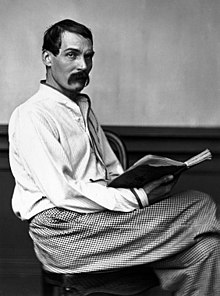Sir Richard Burton
|
Sir Richard Francis Burton KCMG FRGS |
|
|---|---|

Burton in 1864
|
|
| Born |
19 March 1821 Torquay, Devon, England |
| Died | 20 October 1890 (aged 69) Trieste, Austria-Hungary |
| Resting place | St Mary Magdalen Roman Catholic Church Mortlake, London, England |
| Nationality | British |
| Alma mater | Trinity College, Oxford |
| Occupation | Soldier, diplomat, explorer, translator, arabist, author |
| Notable work |
Personal Narrative of a Pilgrimage to Al Madinah and Meccah; The Book of the Thousand Nights and a Night; The Kasidah |
| Spouse(s) | Isabel Burton (m. 1861–90) |
| Military career | |
| Nickname(s) | Ruffian Dick |
| Allegiance |
|
| Service/branch | Bombay Army |
| Years of service | 1842–61 |
| Rank | Captain |
| Battles/wars | Crimea War |
| Awards |
Knight Commander of the Order of St Michael and St George Crimea Medal |
| Signature | |
Sir Richard Francis Burton KCMG FRGS (19 March 1821 – 20 October 1890) was an English explorer, geographer, translator, writer, soldier, orientalist, cartographer, ethnologist, spy, linguist, poet, fencer, and diplomat. He was famed for his travels and explorations in Asia, Africa and the Americas, as well as his extraordinary knowledge of languages and cultures. According to one count, he spoke 29 European, Asian and African languages.
Burton's best-known achievements include a well-documented journey to Mecca, in disguise at a time when Europeans were forbidden access on pain of death; an unexpurgated translation of One Thousand and One Nights (commonly called The Arabian Nights in English after early translations of Antoine Galland's French version); the publication of the Kama Sutra in English; and a journey with John Hanning Speke as the first Europeans to visit the Great Lakes of Africa in search of the source of the Nile.
Burton defied many aspects of the pervasive British ethnocentrism of his day, relishing personal contact with human cultures in all their variety. His works and letters extensively criticized colonial policies of the British Empire, even to the detriment of his career. Although his university education aborted, he became a prolific and erudite author and wrote numerous books and scholarly articles about subjects including human behaviour, travel, falconry, fencing, sexual practices and ethnography. A characteristic feature of his books is the copious footnotes and appendices containing remarkable observations and information.
...
Wikipedia
